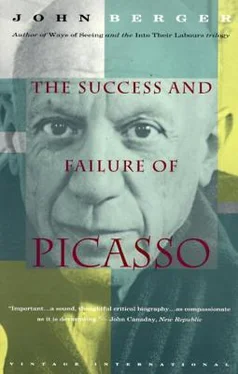Live on the abnormal and unheard-of … sing the anguish of ultimate grief and discover the calvaries of the earth, arrive at the tragic by way of what is mysterious; divine the unknown.

8 Barcelona. Las Ramblas
Nevertheless, Barcelona was not a city like Lyons or Manchester. The fin-de-siècle tone was adopted by some of its intellectuals because it was a provincial city trying to keep up with the capitals. But its own violence was real rather than imaginative, and its extremism was an everyday fact.
In 1906 Alezandro Lerroux, leader of the radicals in Barcelona, exhorted his shock-troop followers who called themselves the ‘Young Barbarians’ as follows:
Enter and sack the decadent civilization of this unhappy country; destroy its temples, finish off its gods, tear the veil from its novices and raise them up to be mothers to civilize the species. Break into the records of property and make bonfires of its papers that fire may purify the infamous social organization … do not be stopped by altars nor by tombs … fight, kill, die.
This is not very far from the old man looking down at Malaga. Neither of them can forgive. In Lerroux one can perhaps sense the beginning of fascism. But this word is often used too loosely. Incipient ‘fascism’ can exist whenever a class or a people feel sufficiently trapped. Fascism, in its modern and precise sense, applies to the exploitation of this feeling by imperialism and big business as a weapon against socialism. In Barcelona at the turn of the century this was not the case.
Barcelona was not fascist but simply lawless. Beginning in the 1890s bombs were being thrown. In 1907 and early 1908 two thousand exploded in the streets. A little after Lerroux’s speech twenty-two churches and thirty-five convents were burnt down. There were a hundred or more political assassinations every year.
What made Barcelona lawless was once more the historical rack. Three groups of interests were each fighting for survival. There was Madrid fighting for its absolutist right, as established by the Habsburgs in the seventeenth century, to live off the riches of its manufacturing province. There were the Barcelona factory-owners fighting for independence from Madrid and the establishment of a capitalist state. (Generally speaking their enterprises were small and at a low level of development. When they were on a larger scale — as in the case of the banks or railways — they were compromised by being tied to political parties and so run in the interests of bureaucratic graft rather than efficiency and profit.) Lastly there was an inexperienced but violent proletariat, largely made up of recent peasant emigrants from the poverty of the south.
Madrid, for its own interests, encouraged the differences between factory-owners and workers. The factory-owners, having no judiciary or state legal machinery with which to control their workers, had to dispense with legality and rule by direct force. The workers had to defend themselves against the representatives of Madrid (the army and the Church) and against the factory-owners. In such a situation, and with little political experience to help them, their aims were inevitably avenging and short-term — hence the continuing appeal of anarchism. Each group — one might almost say each century — fought it out with pistoleros, agents provocateurs, bombs, threats, tortures. All that in other modern cities was settled ‘legally’ — even if unjustly — by the machinery of the state, was settled privately in Barcelona in the dungeons of Montjuich Castle or by guerrilla warfare in the streets.
You may feel that what I have said about Spain has very little to do with Picasso’s own experience. Yet only in fiction can we share another person’s specific experiences. Outside fiction we have to generalize. I do not know and nobody can know all the incidents, all the images in his mind, all the thoughts that formed Picasso. But through some experience or another, or through a million experiences, he must have been profoundly influenced by the nature of the country and society he grew up in. I have tried to hint at a few of the fundamental truths about that society. From these alone we cannot deduce or prophesy the way that Picasso was to develop. After all, every Spaniard is different, and yet every Spaniard is Spanish. The most we can do is to use these truths to explain, in terms of Picasso’s subjective experience, some of the later phenomena of his life and work: phenomena which otherwise might strike us as mysterious or arbitrary.
Yet, before we do this, there is another aspect of Picasso’s early life which we must consider. The most obvious general fact about Picasso is that he is Spanish. The second most obvious fact is that he was a child prodigy — and has remained prodigious ever since.
Picasso could draw before he could speak. At the age of ten he could draw from plaster casts as well as any provincial art teacher. Picasso’s father was a provincial art teacher, and, before his son was fourteen, he gave him his own palette and brushes and swore that he would never paint again because his son had out-mastered him. When he was just fourteen the boy took the entrance examination to the senior department of the Barcelona Art School. Normally one month was allowed to complete the necessary drawings. Picasso finished them all in a day. When he was sixteen he was admitted with honours to the Royal Academy of Madrid and there were no more academic tests left for him to take. Whilst still a young adolescent he had already taken over the professional mantle of his father and exhausted the pedagogic possibilities of his country.
Child prodigies in the visual arts are much rarer than in music, and, in a certain sense, less true. The boy Mozart probably did play as finely as anybody else alive. Picasso at sixteen was not drawing as well as Degas. The difference is perhaps due to the fact that music is more self-contained than painting. The ear can develop independently: the eye can only develop as fast as one’s understanding of the objects seen. Nevertheless, by the standards of the visual arts, Picasso was a remarkable child prodigy, was recognized as such, and therefore at a very early age found himself at the centre of a mystery.
Nobody has yet explained exactly how a child prodigy acquires or inherits his skill and knowledge. Is it that he is born with ready-made connexions in his mind, or is he simply born with a highly exaggerated susceptibility? In popular imagination the prodigy — whether child or adult — has always been credited with magical or supernatural powers: he is always thought of as an agent of some force outside himself. Paganini was believed to have been taught the violin by the devil.
To the prodigy himself his power also seems mysterious, because initially it comes to him without effort. It is not that he has to arrive somewhere; he is visited. Furthermore, at the beginning he does things without understanding why or the reasoning behind them. He obeys what is the equivalent of an instinctual desire. Perhaps the nearest we can get to imagining the extent of the mystery for him is to remember our own discovery of sex within ourselves. And even when we have become familiar with sex and have learnt all the scientific explanations, we still tend to think of the force of it — whether we think in terms of the id or of reproductive instincts — as something outside ourselves, we still tend to project its force on to nature, to which we then gladly submit.
And so it is not surprising that most prodigies believe that they are a vehicle — that they are driven. Keats, the outstanding prodigy of English poetry, makes the point in a letter of 1818. First he distinguishes between two types of poet: the prodigious and the highly self-conscious, like Wordsworth. Of the character of the prodigy he says:
Читать дальше













